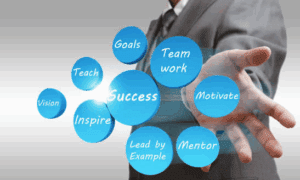Executive coach and psychologist Kristin (Ihle) Molinaroli, Ph.D., has spent much of her 30-year career helping professionals reach their goals. Molinaroli founded Avant, a consulting firm that has racked up an impressive client list of Fortune 500s and buzzworthy startups alike during its 16-year history. And yet, as varied as her clients are, they’re also strung together by all-too-familiar threads: imposter syndrome, burnout, and career plateaus. Thankfully, Molinaroli, a former elite runner (she’s a seven-time All-American collegiate athlete who ran professionally for Nike), knows exactly how to go the distance. “I am wired to ‘set the goal, get the goal,’” Molinaroli admits. But, she cautions, long-term success is far more nuanced than that. Here are some tips she says employers can follow to help their employees score their personal bests.
Be a mentor
Long before the late Kobe Bryant became a household name, he was a starry-eyed high-schooler with big league dreams. “I want to learn how to become the best basketball player in the world. And if I’m going to learn that, I gotta learn from the best,” said Bryant, who counted late-singer Michael Jackson and fellow LA Lakers star Shaquille O’Neal among his mentors during his 20-year career. Just like Bryant went on to become one of the NBA’s most decorated players of all time, learning from the best is what will help employees become superstars of your workplace. Kristin Molinaroli calls mentorship a “cost-effective way to pass on knowledge.” She also adds that one of her core values centers around a people-first-professionals-second mantra that helps colleagues connect on a deeper level. The show of support is crucial when a professional gets a very senior promotion. “I think this holds true in leadership—when someone gets promoted, it is very normal to doubt one’s ability to make the leap, and having someone there who believes in you [is key].”
Use your time—and your employee’s time—wisely
Unfortunately, working from home has placed an unprecedented distance between employers and employees. That’s why Kristin Molinaroli says you’ll have to work harder to develop your employee’s talent. “Companies can also be rethinking projects that no one ever seems to have the time for,” she recently blogged, “and use those projects as opportunities for development. These are seemingly small- and mid-sized projects that are not capital intensive but need a little extra time.” Offering up such projects to employees can open up new avenues to development and success.
Impart humility
No one likes a braggart. Molinaroli says her dearest mentors taught her to take her wins and losses like a true champion. “My mentors, while supportive of my talents, have maintained that ‘there is always someone better than you out there.’ Or, in a professional setting, I’ve been reminded that everyone is replaceable,” she says.
Have a growth mindset
Nurturing a mentor-mentee relationship isn’t only great for employee career growth, it’s also good for the company. Often, mentoring positively impacts increased retention rates and internal promotions that, in turn, cut recruitment expenses. “Now is the perfect time to invest in mentoring,” says Molinaroli. A recent LinkedIn poll conducted by Avant analyzed feedback from the professional platform’s users about what makes an effective leader. It showed that 44% of respondents said their most effective mentors gave constructive feedback; 36% advocated for them; 12% promoted self-discovery; and 8% “cared about me, holistically.” The simple act of mentoring, she says, “will pay dividends — whether literal or figurative — for everyone, and it’s a great way to leave a legacy.” As you consider a growth mindset, it’s crucial to understand that a mentor also grows as a result of his/her relationship with the mentee. “A mentoring relationship is bi-directional rather than a one-way street (i.e., mentor to mentee),” says Kristin Molinaroli. “What this means is many folks who serve as mentors grow and learn due to their experience with the mentee. This half of the equation, mentee to mentor, can sometimes be overlooked.”
Be on time
With Zoom after Zoom crowding everyone’s calendar, it can be hard to squeeze in one-on-one time with your direct report. Still, Molinaroli draws on her experience to stress managers must find the time for an effective mentor-mentee relationship. Throughout her career, there were some who made her feel dismissed, whether they meant to or not. The experience certainly isn’t unique. In another LinkedIn poll from Avant, 29% said their ineffective manager “missed our meetings.” “But some of my best mentors were like a metronome, and I learned first-hand from them how important it is to value others’ time,” she shares.
Savor the journey
The career space is often a rat race, but Kristin Molinaroli wants professionals of all stripes to remember to “stop to enjoy the view,” meaning companies should view career progression and mentorship as a journey—not a sprint to the finish. Molinaroli recalls winning a race but missing a personal best. When her coach sensed her disappointment, “I was reminded of where I started and where I was at,” she recalls. “He helped me put in perspective that one needs to enjoy the journey of getting there; that’s part of the fulfillment.”



































